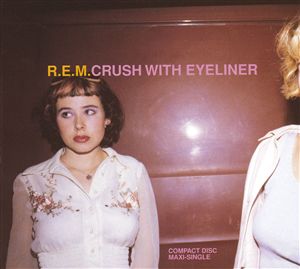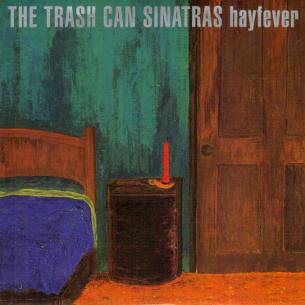
"Linger" is a song by Irish alternative rock band the Cranberries from their debut studio album, Everybody Else Is Doing It, So Why Can't We? (1993). Composed by band members Dolores O'Riordan and Noel Hogan, and produced by Stephen Street, "Linger" was first released as the second and final single from the album on 15 February 1993 by Island Records. It was later re-released on 29 January 1994.

"Rush" is a song by English band Big Audio Dynamite II from their fifth album, The Globe (1991). A longer version of "Rush", entitled "Change of Atmosphere", had previously appeared on the group's 1990 album Kool-Aid.

"Crush with Eyeliner" is a song by American rock band R.E.M., released as the fourth single from their ninth studio album, Monster (1994). Sonic Youth's Thurston Moore provides background vocals. Michael Stipe claims the song was inspired by the band New York Dolls, who, in his opinion, "knew how to exaggerate a song, to make it sound really sleazy and over the top." This was also one of the first songs that surfaced from Stipe after the writer's block that hounded him after the death of his friend, actor River Phoenix.

"Tongue" is a song by R.E.M., released as the fifth and final single from their ninth studio album, Monster (1994), on July 17, 1995. It was only released in the US, UK, and Ireland. In the song, lead singer Michael Stipe performs in falsetto; he has stated on several occasions that the narrator of the song is female. Stipe has also said the track is "all about cunnilingus."

"Disappear" is a song by Australian rock band INXS, the second single taken from their seventh studio album, X (1990). The song was written by Jon Farriss and Michael Hutchence while they were living together in Hong Kong in 1989.

"I'd Die Without You" is a song by American R&B duo P.M. Dawn. The song first appeared on the soundtrack of the 1992 film Boomerang and was one of several songs to chart from the album. The song later appeared on P.M. Dawn's own The Bliss Album...? (1993), and on their 2000 greatest hits collection, The Best of P.M. Dawn.

"Violence of Summer " is a song by English new wave band Duran Duran, the first single from their sixth studio album, Liberty (1990). Having finished the 1980s with the Decade singles compilation, Duran Duran found the 1990s a new challenge, in which success would initially elude them. The lukewarm success of "Violence of Summer" would shadow the band for the next few years until 1993's "Ordinary World" returned them to chart success. The single reached number two in Italy but fared poorly in other countries, reaching number 20 in the United Kingdom and number 64 in the United States.

"Hold On" is a song by American girl group En Vogue, released in early 1990 as the first single from their debut album, Born to Sing (1990). It was produced by Denzil Foster and Thomas McElroy, and written by the former two and all members of the group. It peaked at number five in the UK and number two on the Billboard Hot 100 in the US. In addition, the song reached number-one on both the Billboard Dance Club Songs and Hot R&B/Hip-Hop Songs charts. In 2007, the song's chorus was used and performed by Pharrell on Jay-Z's song "Blue Magic". It was also sampled in the Terminator X song "Buck Whylin'". En Vogue performed "Hold On" at the 2008 BET Awards with Alicia Keys. In 2017, it was ranked number four in Spin magazine's ranking of "The 30 Best '90s R&B Songs".

"Tell That Girl to Shut Up" is a song written by American singer-songwriter Holly Beth Vincent and originally recorded by her band Holly and the Italians in 1979. A cover version by UK pop rock band Transvision Vamp was released in 1988 as the second single from their debut album Pop Art. In Australia, "Tell That Girl to Shut Up" was released in 1989 as the third single from the album, following the 1988 release of "Revolution Baby".

"Roam" is a song by American new wave band the B-52's. It was released as the fourth single from their fifth studio album, Cosmic Thing (1989), following "(Shake That) Cosmic Thing", "Channel Z", and "Love Shack". The vocals are sung by Kate Pierson and Cindy Wilson, making it the only vocal track on the album without any vocal involvement from Fred Schneider.

"You're History" is a song by British-based pop act Shakespears Sister, released in July 1989 as the second single from their debut album, Sacred Heart (1989). The song was the first release to present the act as a duo and their first chart hit, reaching number seven in the United Kingdom. Outside the UK, "You're History" reached number five in Finland and entered the top 40 in Australia, Ireland, and New Zealand.

"Constant Craving" is a song written by k.d. lang and Ben Mink, performed by lang and included on her second solo album, Ingénue. The song was released in 1992 and won her the Grammy Award for Best Female Pop Vocal Performance in 1993, as well as an MTV Video Music Award for Best Female Video.

"Dreams" is the debut single of Irish rock band the Cranberries. It was originally released in September 1992 and later appeared on the band's debut album, Everybody Else Is Doing It, So Why Can't We? (1993). The song reached the top 50 of the US Hot 100 and the top 30 of the UK Singles Chart in early 1994. A 1990 demo version was released in Ireland only in the summer of that year under their initial band name, the Cranberry Saw Us. At the end of the song, the backing vocals are sung by Mike Mahoney, ex-boyfriend of Cranberries lead singer Dolores O'Riordan.

"The Only One I Know" is the second single by English rock band the Charlatans. It was their first top-10 hit, reaching No. 9 on the UK Singles Chart. In the UK it was the highest-charting single from the Some Friendly album. Its best showing in the US was on the Modern Rock Chart, where it reached No. 5 in September 1990.

"Love Train" is a song by English singer Holly Johnson, released in 1989 as the lead single from his debut solo album, Blast (1989). It was written by Johnson and produced by Andy Richards and Steve Lovell with additional production by Stephen Hague. The song reached No. 4 in the United Kingdom, spending 11 weeks on the chart, and was certified silver by British Phonographic Industry (BPI) in February 1989. In the United States, the song reached No. 65 on the Billboard Hot 100.

"Metropolis" is a song by Australian alternative rock band the Church. It was released as the lead single from their sixth album, Gold Afternoon Fix (1990), and the songwriting credits were given to all four members of the band. The song topped the US Billboard Modern Rock Tracks chart and reached number 19 in Australia. A music video directed by David Hogan and produced by Chris O'Brien was made for the song.

"Hayfever" is a song by Scottish band The Trash Can Sinatras, which was released in 1993 as the lead single from their second studio album I've Seen Everything. The song was written by all five band members and produced by Ray Shulman. "Hayfever" reached No. 61 in the UK Singles Chart and No. 11 in the Billboard Modern Rock Tracks chart.

"Obscurity Knocks" is a song by Scottish band The Trash Can Sinatras, which was released in 1990 as an extended play from their debut studio album Cake. It was written by all five band members and produced by Roger Béchirian. The EP reached No. 86 in the UK and remained on the chart for four weeks. In 1991, the song reached No. 12 on the Billboard Modern Rock Tracks chart.

"Paradise" is a song by English singer-songwriter Black, which was released in 1988 as the fifth and final single from his debut studio album Wonderful Life. The song was written by Black and Dave "Dix" Dickie, and produced by Dix. "Paradise" reached number 38 in the UK Singles Chart and remained in the top 100 for four weeks.

"I Don't Know Why I Love You" is a song from English alternative rock band The House of Love, which was released by Fontana in the UK in 1989 as the second single from their second studio album The House of Love (1990). The song was written by Guy Chadwick, and produced by Stephen Hague and Dave Meegan. "I Don't Know Why I Love You" peaked at number 41 in the UK Singles Chart.




















